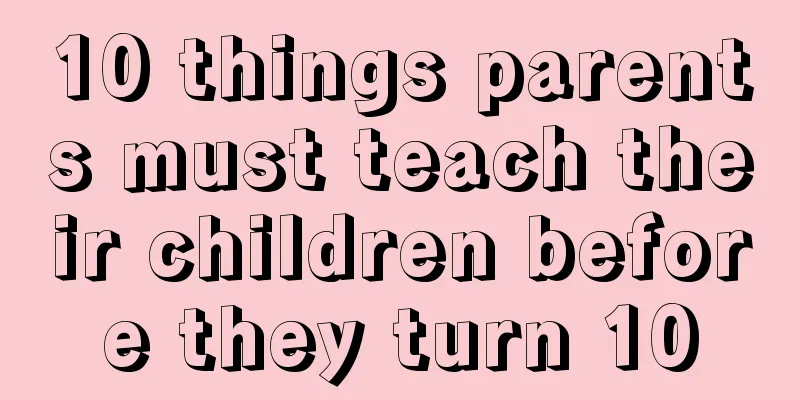The top 6 behaviors that children dislike their parents

|
It is a sad thing that due to the lack or inappropriate educational methods of some parents, their education not only has no effect but also produces negative effects, causing resentment among their children. In order to prevent our parents from having “good intentions but bad results”, let’s first take a look at what children hate most about their parents’ practices. 1. Nagging When it comes to expressing their dissatisfaction and resentment towards their parents, almost all children choose nagging. They said: "Many things can be said only once, but they always keep nagging and never stop. Although we know that they nag to urge themselves, but when they say it too many times, we feel annoyed." One of my students said, "My mother is such a nagging woman. She complains, blames, and nags all day long. It seems that nothing makes her happy. My good mood is ruined by her nagging every day. Now I feel crazy when I hear her nagging. I really can't stand it. I'm about to collapse." The student had just finished speaking when another student took over and said, "When parents talk too much, I will develop rebellious emotions. Every time I hear my mother nagging, I lock my door and stuff little paper balls in my ears..." The students rushed to criticize their parents, as if they were holding a complaint meeting. It can be seen that nagging is a big killer of family education. Children are so disgusted with nagging, but parents often love nagging. It can be said that the contradiction is prominent. So, why do most parents love to nag, while children hate nagging so much? Parents often have high expectations for their children, always hoping that their children will do everything according to their wishes. If something is not going their way, they will preach to them non-stop, and this over and over again becomes nagging. When parents nag, they usually blame, criticize, complain, and sometimes even sarcastically comment on it. Of course, children don’t like to hear it and may even feel annoyed. After finding the root cause of the problem, we as parents must remind ourselves from time to time to pay attention to controlling our emotions, correctly grasp the psychological state of our children, learn to respect our children, give them appropriate reminders, not nag about big or small things, not cause children's disgust, and guide them with conversations that they can accept. Only such education is easy for children to accept and is effective. 2. Bad temper, doesn’t care about right or wrong, and scolds anyone he catches Although this situation is not a common phenomenon, it ranks second, which shows that children are disgusted with their parents' rude attitude. One of my students said, "I really don't know why my dad has such a bad temper. He gets angry at the slightest thing he doesn't like. At home, as long as he doesn't like me, he will yell at me without asking any questions and won't let me explain or defend myself. I really hate my dad's behavior." Another student said, "Both my parents have bad tempers and they often quarrel with each other. They are the same to me, too. They often scold me for trivial matters, which hurts my self-esteem." Another student said, "My neighbor's parents often yell at their children for trivial matters and physically punish them. I think these parents have very poor upbringing and are not worthy of being parents." See, children so dislike parents who have bad tempers and simple methods. Therefore, in order to achieve good educational results and to set a good example for their children, parents should strengthen their self-cultivation, try their best to restrain themselves and remind themselves not to get angry over trivial matters, and never take their children as the object of their anger. When children need reminders or education, parents should also do so in a way that the children can accept. Don't be too crude or the effect will be counterproductive. 3. Complaining and blaming others all the time, comparing yourself with others This seems to be a common problem among most parents. Because they have too high expectations for their children, they are too harsh on them. When the child's performance is not in line with one's own expectations, they complain and blame the child. They are eager to see their sons become successful and their daughters become outstanding, and always hope that their children are the best in the class, grade, school, or even the world. They are not satisfied with their children's performance. Moreover, they always compare the advantages of other people's children with the disadvantages of their own children. Their purpose is of course to motivate their children, but they forget that doing so will not only cause children's disgust and fail to achieve the purpose of motivation, but will seriously undermine children's self-esteem and self-confidence, and bring serious psychological shadows to children's growth. Because you always say that he is not as good as others in this and that, the child is used to hearing negative comments. How can he have self-confidence and desire to succeed? A student told me: "My mother always says that I am not good enough. She always compares me with other classmates. Why did someone score more than 90 points in the exam, but you only scored 80 points? Someone is in the top 3 every semester, but you can't even get the 5th place. She always says this, as if I don't have any advantages. Later I told her that I am not good in this and that, so you should be someone's mother!" Therefore, in order to give children self-confidence and the desire to pursue success, parents must overcome the bad habits of complaining, blaming, and comparing other children's strengths with their own children's weaknesses, and give their children more positive guidance and evaluation. This will help build children's self-confidence and promote their healthy growth. 4. Adopting an imperative approach, being unreasonable, and overly restricting freedom Although such parents are not the majority, they are still ranked fourth. This shows how strong their children's desire for understanding, equality, and individuality is. I heard from one of my students that her parents are very strict and detailed in their management of her, and most of the management is unreasonable and restrictive. For example, they don't allow her to go out to play, watch TV, play computer games, buy clothes she likes, cut her favorite hairstyle, or interact with male classmates... They don't allow her to do this or that, which makes her feel very disgusted and depressed. Another student said: His mother forced him to drink milk every morning. His parents cared about him too much. They treated him like a three-year-old child, which made him very unhappy. Once he and several classmates made an appointment to go to the community to do volunteer work, but his mother would not let him do so, saying that it would affect his studies. She also added that there were many things to do at home, and if he wanted to be a volunteer he should work at home. This made him very angry, and he had a big fight with his mother . Therefore, do not be too strict, too meticulous, or too controlling when dealing with children, but also do not be simple and rude. Fully respect children, be less commanding, and more negotiating, so that children can grow up in an equal and relaxed family environment. This will help build a healthy personality in children. 5. Not caring about anything else except studying, and signing up for various tutoring classes This seems to be common to all parents. They only focus on their children's homework books and report cards. They only ask that their children get good grades. Everything else can be ignored. In order to make their children outstanding, top-notch, and versatile, they also enroll their children in many tutoring classes, interest classes, and specialty classes, regardless of whether the children like it or not, whether they have special skills, or whether they have interests. One of my students said: "My parents seem to only like to talk to me about study. They are not interested in school life or my own interests and hobbies." Another student felt the same way. He said, " I was chatting about football with my father once, but after just a few words, my father changed the subject and began to lecture me. He said, 'If you don't study hard, you won't be able to find a job in the future, and you may not even be able to afford a ticket to a football game!' It made me very uncomfortable. How can I communicate with him like this?" Another student said, "When I was young, my parents enrolled me in many interest classes, such as music, art, English, etc., but I didn't stick with any of them. Now, during every holiday, they would hire a tutor for me to give me extra lessons. I feel that my grades are not outstanding but they are okay, but my parents are not satisfied. Sometimes I don’t understand, who is actually studying...” See, this is the child’s true thoughts and feelings. Here, I would like to remind parents that this kind of quick success and instant benefit approach will make children feel disgusted, and such an educational method is doomed to fail. 6. Swearing, bragging, and inappropriate clothing Although this type of parents is only a minority, they are also disliked by children. I remember once at a parent-teacher meeting, the mother of a female student came in a slovenly manner. Compared with other parents who dressed well, his child felt that his self-esteem was greatly hurt. After returning home, he lost his temper with his mother and asked her not to come to the school to find him again. I have been teaching for more than 20 years, during which time I have come into contact with many parents. Most of them are relatively elegant, modest and decent, but there are a few who are really inappropriate. Some people are careless and use swear words all the time when they open their mouths. They don't realize it themselves, but people who listen to them feel uncomfortable. There are also some parents who love to brag. No matter who they talk to, they are always confusing and it is impossible to understand them. There are also a few parents who do not pay attention to their appearance and dress too casually, sloppily, and untidyly. Children will naturally feel ashamed if they have such parents. Therefore, this deserves the attention of all our parents. The above are some of the things that children hate most about their parents. In addition to this, of course there are many other reasons, such as not trusting children, not being able to evaluate children correctly, overprotecting children or letting them do whatever they want, etc. If we want to make our educational results more significant, we must improve our educational methods and conduct family education in a way that children are willing to accept. Never treat children in a way that they would object to. |
<<: The 10 most effective rules for educating children
>>: Are you guilty of these 10 unforgivable bad habits as a parent?
Recommend
Premature baby care routine
Babies who are born before their full term are ca...
Causes of stomach pain in girls
There are many reasons why girls experience stoma...
What to use to reduce fever in children
When children have a fever, parents are very anxi...
What is the thing that prevents hunchback?
Hunchback is a phenomenon of spinal curvature tha...
What to do if your baby boy keeps dripping urine
Don't think that only girls will have various...
What to do if your child has high blood pressure
High blood pressure is a very common disease. Thi...
Why do children not have diarrhea but have stomach pain?
Children's gastrointestinal system is imperfe...
What to do if your newborn moves his hands and feet while sleeping
When a baby is just born, his body is easily affe...
When is the best time for children to have their teeth fixed?
Tooth deformity is a problem that many children a...
What should I do if my eight-month-old baby has heatstroke?
If the weather is hot, staying outside for a long...
How to treat rhinitis in children?
Children’s immunity and various functions are not...
Can an eight month old baby stand?
Some parents hope that their children can stand u...
What is the cause of high myocardial enzymes in children?
Children's health issues have always been the...
The child is awake and coughing
Some children are prone to coughing after waking ...
Causes of anemia in five-month-old children
When children are very young, they will either su...









